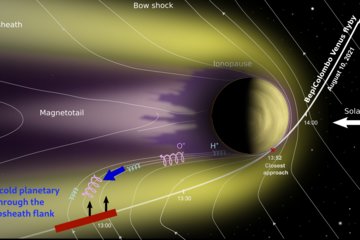All genres
81.
Conference Paper
The volatile composition of comet C/2004 Q2 (Machholz) derived from submillimeter observations. In: Highlights of Spanish Astrophysics VII, Proceedings of the X Scientific Meeting of the Spanish Astronomical Society (SEA) (Eds. Guirado, J. C.; Lara, L. M.; Quilis, V.; Gorgas, J.). (2013)
82.
Conference Paper
Observations of Comet 9P/Tempel 1 and Deep Impact by the OSIRIS Cameras onboard Rosetta. In: Deep Impact as a World Observatory Event: Synergies in Space, Time, and Wavelength, pp. 29 - 39. Springer Berlin / Heidelberg (2009)
83.
Conference Paper
Modeling of the Terminal Velocities of the Dust Ejected Material by the Impact. In: Deep Impact as a World Observatory Event: Synergies in Space, Time, and Wavelength, pp. 137 - 142. Springer Berlin / Heidelberg (2009)
84.
Conference Paper
The terminal Velocity of the Deep Impact dust Ejecta. In: Revista Mexicana de Astronomía y Astrofísica (SC)., pp. 25 - 26 (Eds. Magris, G.; Bruzual, G.; Carigi, L.). (2009)
85.
Conference Paper
SK 1: A Possible Case of Triggered Star Formation in Perseus. In: Triggered Star Formation in a Turbulent Interstellar Medium (IAU S237) (Eds. Elmegreen, B.; Palous, J.). Cambridge University Press (2007)
86.
Conference Paper
Submillimetre Imaging of Deeply Embedded Outflow Sources and Class 0 Sources. In: Abstracts of Contributed Talks and Posters presented at the Annual Scientific Meeting of the Astronomische Gesellschaft at the Joint European and National Meeting JENAM 2001. (2001)
87.
Talk
Caracterizando las atmósferas de los planetas: espectros, procesos y estructura. BrainGain-PWF Venezuelan Physics School 2022, Online (2022)
88.
Talk
Atmospheric Characterization of (Exo)Planets: Spectra, Processes and Structure. Maynooth University, Department of Experimental Physics, Ireland, Online (2021)
89.
Talk
Júpiter y sus lunas heladas: lo que nos enseñará la misión espacial JUICE. Parque Explora y Planetario de Medellín, Colombia, Online (2021)
90.
Talk
Deciphering Jupiter’s atmospheric chemistry as a benchmark for extrasolar gas giants using Herschel/PACS. DFG SPP1992 virtual all-hands-on-deck meeting, Online (2021)
91.
Talk
Investigating physico-chemical mechanisms in (exo)planetary atmospheres and their impact on the observables. DFG SPP1992 virtual all-hands-on-deck meeting, Online (2021)
92.
Talk
Deciphering Jupiter’s atmospheric chemistry as a benchmark for extrasolar gas giants using Herschel/PACS. Virtual Annual Meeting of the German Astronomical Society, Online (2021)
93.
Talk
Characterization of Jupiter’s Atmosphere Using Far Infrared Spectra Measured with PACS Onboard the Herschel Space Observatory. Asia Oceania Geosciences Society 18th Annual Meeting (AOGS2021), Online (2021)
94.
Talk
Ground-based measurements of HCN abundances in the stratosphere of Titan: an inter-comparison with Herschel observations. Asia Oceania Geosciences Society 18th Annual Meeting (AOGS2021), Online (2021)
95.
Talk
Tracing the gas composition of Titan´s stratosphere from space, ground and airborne-based observatories. Workshop: "The Future of Airborne Infrared/Submm Astronomy: Prospects and Opportunities", online (2021)
96.
Talk
Characterisation of Jupiter´s atmosphere with Herschel/PACS. 2nd Teleconference for the Ariel Working Group “Synergies with Solar System Planets, Online (2021)
97.
Talk
Caracterizando las atmósferas de planetas desde la Tierra y el espacio. Peruvian Association of Astrobiology, Online (2021)
98.
Talk
Atmospheric characterisation of exoplanets through interpretation of their spectra. Online Seminar at Thüringer Landessternwarte , Tautenburg, Germany (2020)
99.
Talk
Retrieval of Jupiter’s atmospheric parameters using far infrared spectra measured with PACS onboard the Herschel Space Observatory. Europlanet Science Congress 2020, online (2020)
100.
Talk
Key physico-chemical mechanisms in (exo)planetary atmospheres and their impacts on the observables. "Exploring the diversity of extrasolar planets", Virtual Annual Meeting of the German Astronomical Society (2020)











